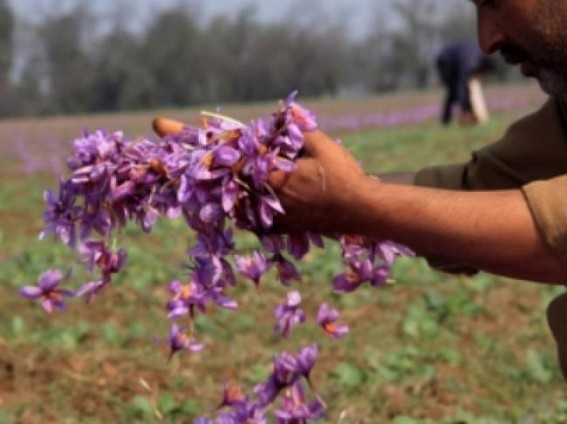TIWN

Srinagar, Jun 30 (TIWN): The J&K government has launched new initiatives to promote the marketing and export of specific products from the union territory. Geographical Indication (GI) tagging is also one such initiative which would go a long way in marketing and exporting specific products like saffron.
Kashmir saffron, which is cultivated and harvested in the Karewa (highlands) of Jammu and Kashmir, has been given the GI tag by the Geographical Indications Registry. The spice is grown in some regions of Kashmir including Pulwama, Budgam, Kishtwar and Srinagar region of J&K.
This is a landmark development. The application was filed by the Directorate of Agriculture, Government of Jammu & Kashmir and facilitated by the Sher-e- Kashmir University of Agriculture Science and Technology, Kashmir and Saffron Research Station, Dussu (Pampore).
With the GI tag for Kashmir saffron, India has become the only saffron producing country for which the indication has been assigned. India as a signatory of WTO's TRIPS (Trade Related Aspects of Intellectual Property Rights) and an active member of the WIPO (World Intellectual Property Organisation) has a law for protection of GI, viz "Geographical Indications of Goods (Registration and Protection) Act, 1999. The GI tag is issued after the GI registry under the Department of Promotion, Industry and Internal Trade (DPIIT), Ministry of Commerce and Industry.
According to the World Intellectual Property Organisation (WIPO), GI is a sign used on products that have a specific geographical origin and possess qualities or a reputation that are due to that origin. In order to function as a GI, a sign must identify a product as originating in a given place.
- Trump Administration Removes Tariffs on Over 200 Food Items Including Beef
- Indian media and entertainment sector projected to cross $100 billion by 2030
- Maruti Suzuki India recalls 39,506 Grand Vitara units over fuel indicator fault
- India’s industrial growth at 3.5 pc in July signals healthy recovery: Economists
- AI to unlock $500 billion opportunity for India’s tech services: Report



